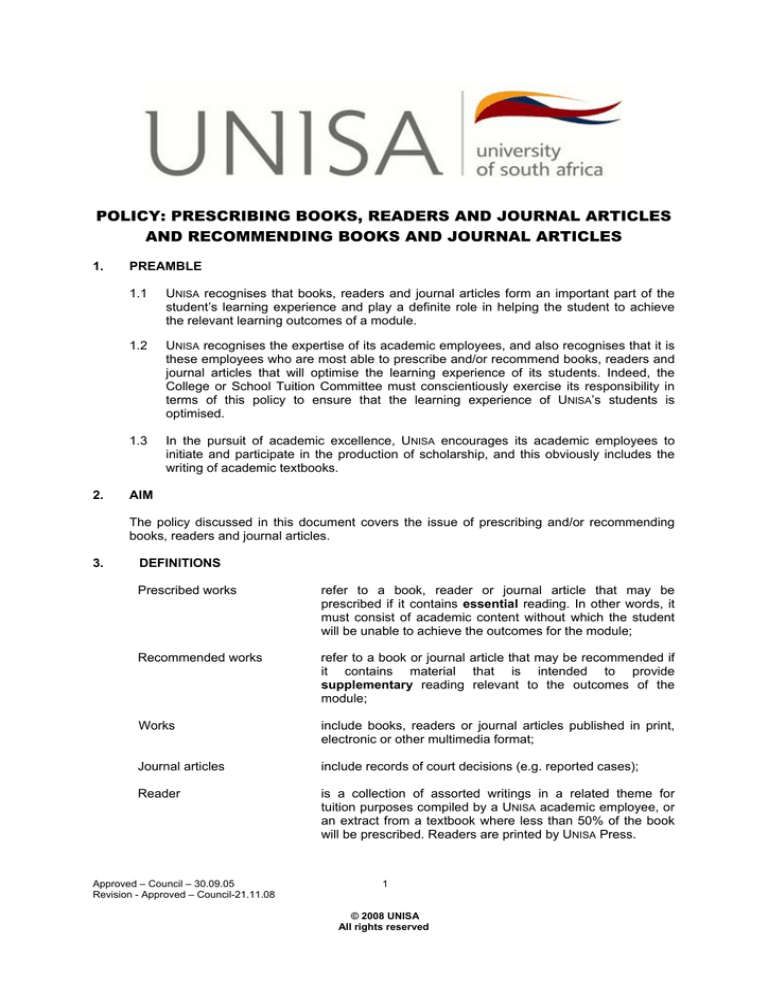
POLICY: PRESCRIBING BOOKS, READERS AND JOURNAL ARTICLES
AND RECOMMENDING BOOKS AND JOURNAL ARTICLES
1.
2.
PREAMBLE
1.1
UNISA recognises that books, readers and journal articles form an important part of the
student’s learning experience and play a definite role in helping the student to achieve
the relevant learning outcomes of a module.
1.2
UNISA recognises the expertise of its academic employees, and also recognises that it is
these employees who are most able to prescribe and/or recommend books, readers and
journal articles that will optimise the learning experience of its students. Indeed, the
College or School Tuition Committee must conscientiously exercise its responsibility in
terms of this policy to ensure that the learning experience of UNISA’s students is
optimised.
1.3
In the pursuit of academic excellence, UNISA encourages its academic employees to
initiate and participate in the production of scholarship, and this obviously includes the
writing of academic textbooks.
AIM
The policy discussed in this document covers the issue of prescribing and/or recommending
books, readers and journal articles.
3.
DEFINITIONS
Prescribed works
refer to a book, reader or journal article that may be
prescribed if it contains essential reading. In other words, it
must consist of academic content without which the student
will be unable to achieve the outcomes for the module;
Recommended works
refer to a book or journal article that may be recommended if
it contains material that is intended to provide
supplementary reading relevant to the outcomes of the
module;
Works
include books, readers or journal articles published in print,
electronic or other multimedia format;
Journal articles
include records of court decisions (e.g. reported cases);
Reader
is a collection of assorted writings in a related theme for
tuition purposes compiled by a UNISA academic employee, or
an extract from a textbook where less than 50% of the book
will be prescribed. Readers are printed by UNISA Press.
Approved – Council – 30.09.05
Revision - Approved – Council-21.11.08
1
© 2008 UNISA
All rights reserved
4.
PRESCRIBING A BOOK
4.1
The following criteria should be taken into consideration when prescribing a book:
4.1.1
The book should preferably be the most recent edition. Information on new
editions can be obtained by consulting the electronic database in the UNISA
Library or by contacting the publisher.
4.1.2
Cost is an important factor when prescribing a book. It is therefore important to
consider the price of the book or books in relation to the cost of the module.
Where possible, low price editions and international student editions should be
prescribed. Special prices can – and should – be negotiated with publishers. The
Prescribed Books Section must be informed of arrangements made with
publishers regarding special price editions.
4.1.3
The number of prescribed books must be taken into consideration when
determining the notional hours (credit value) of the module.
4.1.4
The extent to which the book will help in the Africanisation of the module must be
taken into consideration.
4.1.5
If less than 50% of a book is prescribed, the use of the book must be justified to
the satisfaction of the College or School Tuition Committee. The College or
School Tuition Committee must also consider the possibility of including the
prescribed material in a reader.
4.1.6
The prescribed book must be appropriate to the level of study and only in
exceptional circumstances should the same book be prescribed for both underand postgraduate studies.
4.2
Once a book is prescribed for a specific academic year and the booksellers have been
informed, it may not be withdrawn, since UNISA signs contracts with official booksellers in
order to ensure the availability of prescribed books.
4.3
Under no circumstances may UNISA’s infrastructure be used to sell prescribed books
directly or indirectly on behalf of another entity or for the personal account of a UNISA
employee or any other entity of which the employee is a member, or in which the
employee has a direct or indirect interest.
4.4
Special attention must be given to prescribed books authored by UNISA employees. The
College or School Tuition Committee must ensure that the process of prescribing these
books is transparent, impartial and that the books are of an acceptable quality. The
following guidelines are intended to help the Committee make its recommendation:
•
Is the book peer reviewed?
•
Is the book published by a recognised academic publisher?
•
Is the employee a sole author or part of a team?
•
Does the book form part of a study package containing a wraparound guide
developed with the assistance of ICLD, or is it the book the only tutorial matter in the
study package?
•
Is the book the best book available on the market, given the learning outcomes of
the module, contextualisation, appropriate language level and the expertise of the
author(s)? (See also 4.1.)
Approved – Council – 30.09.05
Revision - Approved – Council-21.11.08
2
© 2008 UNISA
All rights reserved
4.5
5.
•
Is the book prescribed at other higher education institutions?
New books that are in the process of publication may only be prescribed –
•
If the publisher provides a written undertaking to the satisfaction of the Executive
Director: Study Material, Publications, Production and Delivery that the book will be
available at the time when registration commences.
•
If the written undertaking accompanies the application to prescribe the book.
•
If the application includes a feasible alternative in the event that the book is not
available when registration commences.
4.6
In cases where a further edition of a book is due, but will not be available in time for the
academic year in question, a reprint of the existing edition should be negotiated with the
publisher if there are insufficient quantities of the current edition available. Alternatively,
UNISA Press can be contacted for the purposes of obtaining a temporary licence to
reprint the book.
4.7
Academic employees must ensure that books will be in print for the relevant academic
year. Out-of-print books may not be prescribed. If a book goes out of print during the
period it is prescribed, UNISA Press may be approached to obtain a licence to reprint
specifically for UNISA students. Alternatively, other arrangements must be made.
4.8
College or School Tuition Committees must ensure that prescribed books are approved
before a wraparound guide is developed.
4.9
The Library keeps limited copies of prescribed books as part of its collection, but cannot
undertake to meet the needs of UNISA’s student body because of the numbers involved
and the fact that a student needs to consult the prescribed book throughout the study
period.
RECOMMENDING A BOOK
5.1
The following criteria should be taken into consideration when recommending a book:
5.1.1
A recommended book is intended to provide supplementary reading relevant to
the outcomes of the module. Academic employees must think carefully before
including recommended books in a module, since this has significant financial
and logistical implications for the Library, regional centres and other departments
in UNISA. Under no circumstances may a student be prejudiced for failing to use
a recommended book.
5.1.2
The book should preferably be the most recent edition. Information on new
editions can be obtained by consulting the Library’s electronic database or by
contacting the publisher.
5.1.3
Cost is an important factor when recommending a book. It is therefore important
to consider the price of the book or books in relation to the cost of the module
and the cost of the prescribed book.
5.1.4
A recommended book is not taken into consideration when determining the
notional hours (credit value) of the module.
5.1.5
The recommended book must be appropriate to the level of study and only in
exceptional circumstances should a book be recommended for both under- and
postgraduate studies.
Approved – Council – 30.09.05
Revision - Approved – Council-21.11.08
3
© 2008 UNISA
All rights reserved
6.
5.2
Under no circumstances may UNISA’s infrastructure be used to sell recommended books
directly or indirectly on behalf of another entity or for the personal account of a UNISA
employee or any other entity of which the employee is a member, or in which the
employee has a direct or indirect interest.
5.3
New books that are in the process of publication, or where a further edition of a book is
due but will not be available in time for the academic year in question, may not be
recommended.
5.4
As part of its collection, the Library keeps multiple copies of recommended books in
accordance with the number of students enrolled on a course. These books can be
requested from the Library.
COMPILING AND PRESCRIBING READERS
6.1
Readers may be developed for a module at any level. In developing the study material
for all NQF level 5 modules, academic employees must consider whether it is necessary
to prescribe a book and the possibility of replacing the book with a reader. The College
or School Tuition Committee must record the reasons why it decided not to develop a
reader for a NQF level 5 module and would rather make use of a prescribed book. Where
less than 50% of a book is prescribed, the College or School Tuition Committee must
replace the book with a reader.
6.2
In the case of a reader, UNISA Press will ensure that all relevant copyright laws are
adhered to.
6.3
Consideration should be given to the following criteria when compiling and prescribing
a reader:
6.4
7.
6.3.1
Cost is an important factor. It is therefore important to consider the number of
items included in the reader and the possibility of making use of open source
materials.
6.3.2
The content of the reader must be taken into account when determining the
notional hours (credit value) of the module.
6.3.3
The extent to which the reader will be integrated with the guide, help to
Africanise the module and attain the learning outcomes must all be taken into
consideration.
6.3.4
The content of the reader must be appropriate to the level of study; only in
exceptional circumstances should a reader be recommended for both under- and
postgraduate studies.
College or School Tuition Committees must ensure that readers are approved before a
wraparound guide is developed.
PRESCRIBING OR RECOMMENDING A JOURNAL ARTICLE
7.1
The following criteria must be taken into consideration when prescribing or
recommending a journal article:
7.1.1
Cost is an important factor when prescribing or recommending a journal article.
Copyright clearance must be sought for articles not available in UNISA’s
databases before these articles can be made available in the Library’s electronic
Approved – Council – 30.09.05
Revision - Approved – Council-21.11.08
4
© 2008 UNISA
All rights reserved
reserves. It is therefore important to consider availability of articles in the
Library’s databases first before recommending or prescribing a unique article that
is only available in print.
8.
7.1.2
The number of prescribed or recommended articles not available in the
databases must be kept to the minimum in view of copyright costs. It is
recommended that no more than three articles that are not available in the
databases be recommended or prescribed per course. A motivation to exceed
the recommended number must be submitted to the Library for approval.
7.1.3
The extent to which the article will help in the Africanisation of the module must
also be taken into consideration.
7.1.4
The prescribed or recommended article must be appropriate to the level of study
and only in exceptional circumstances should the same article be prescribed for
both under- and postgraduate studies.
7.2
Under no circumstances may UNISA’s infrastructure be used to sell prescribed or
recommended articles directly or indirectly on behalf of another entity or for the personal
account of a UNISA employee or any other entity of which the employee is a member, or
in which the employee has a direct or indirect interest.
7.3
New journal articles which are in the process of publication may only be prescribed or
recommended –
•
if the editor provides a written undertaking to the satisfaction of the Executive
Director: Study Material, Publications, Production and Delivery that the article will be
available at the time when registration commences.
•
if the written undertaking accompanies the application to prescribe the article.
•
if the application includes a feasible alternative in the event that the article is not
available when registration commences.
7.4
College or School Tuition Committees must ensure that the prescribed article is
approved before a wraparound guide is developed.
7.5
A recommended article is not taken into consideration when determining the notional
hours (credit value) of the module. The number of prescribed articles is, however, taken
into consideration when determining the notional hours (credit value) of the module.
INCLUSION OF PRESCRIBED MATERIAL IN STUDY PACKS
8.1
Readers are included in the study pack but, as a general rule, prescribed or
recommended books and journal articles are not included.
8.2
A prescribed book will only be included in the study pack in exceptional circumstances
and provided it has been approved by a sub-committee appointed by the Senate Tuition
Committee dealing with this matter. The Senate Tuition Committee will determine the
composition of the sub-committee, but it must include the Executive Director: Study
Material, Publications, Production and Delivery and the Executive Director: Academic
Planner.
8.3
The primary criteria which the committee will take into consideration when considering
the applications are as follows:
Approved – Council – 30.09.05
Revision - Approved – Council-21.11.08
5
© 2008 UNISA
All rights reserved
9.
•
where student numbers in the module are below 20 and it is not practical for the
books to be stocked by the panel of official booksellers,
•
where books are published by obscure publishers who do not have representatives in
South Africa and are thus difficult for booksellers to obtain,
•
where there are no relevant open source materials available.
8.4
Applications to include books in the study pack are made on an annual basis and
approval will be for one year only. Before an application to include prescribed books in
the study pack is considered, the book must have been considered in terms of rule 4
above and recommended by the Executive Committee of College in terms of rule 9.2
below.
8.5
The Directorate: Planning and Coordination will be responsible for managing the process
of considering applications to include prescribed books in the study pack.
PROCEDURES FOR APPROVING BOOKS AND READERS
9.1
All books, readers and journal articles must be evaluated and approved in the academic
departments and schools. The College or School Tuition Committee shall be responsible
for managing the process. Where relevant, inputs from advisory committees should be
obtained.
9.2
Departmental lists, based on the criteria listed in paragraphs 4 to 7, must be submitted by
the due date as provided for in the Academic Planning Calendar to the College or School
Tuition Committee and thereafter to the Executive Committee of College for final
approval.
9.3
Any deviations from the guidelines, as well as differences of opinion, must be recorded
and clearly indicated in the report to the Executive Committee of College.
9.4
In cases of differences of opinion, the Executive Committee of College may request
external peer reviews.
9.5
Information on books, readers and journal articles must be captured on the relevant
database provide for in myUnisa.
WWWW
Approved – Council – 30.09.05
Revision - Approved – Council-21.11.08
6
© 2008 UNISA
All rights reserved





